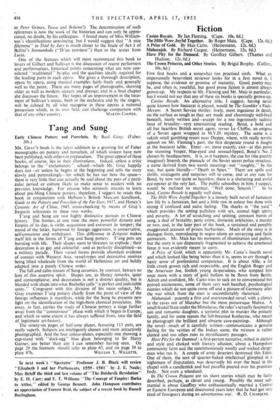Fiction
Casino Royale. By Ian Fleming. (Cape. 10s. 6d.) Maharajah. By Richard Cargoe. (Heinemann. 12s. 6d.) FIVE first books and a somewhat too practised sixth. What an impersonally benevolent reviewer looks for in a first novel is, I suppose, the evidence or promise of maturity. Good poetry may be, and often is, youthful, but good prose fiction is almost always grown-up. My respects to Mr. Fleming and Mr. Mais in particular, but I would not say that any of these six books is specially grown-up.
Casino Royale. An alternative title, I suggest, having never quite known how baccarat is played, would be The Gambler's Vade- Mecum. A Secret Service thriller, lively, most ingenious in detail, on the surface as tough as they are made and charmingly well-bred beneath, nicely written and—except for a too ingeniously sadistic bout of brutality—very entertaining reading. Bond, a bold and all but heartless British secret agent, versus Le Chiffre, an enigma of a Soviet agent wrapped in M.V.D. mystery. The scene is a rakish small gambling resort near Dieppe, where, with really terrific aplomb on Mr. Fleming's part, the first desperate round is fought at the baccarat table. Enter—or, more exactly, exit—at this point the stunning Vesper, blue-eyed and sensual-lipped, Bond's No. 2 chosen by headquarters. It is, as it happens, the cue for (the prettily imagined) Smersh, the pinnacle of the Soviet secret police structure, a name derived from two words meaning—not "roughly," by the way, but quite literally—"Death to Spies." There are spills and thrills, stratagems and surprises still to come, and at any rate for Bond, by now not quite so heartless, there is a shattering and awful eye-opener at the very last. The public schoolboy in him, I suspect, would be inclined to murmur, "Well done, Smersh !" In its kind, Casino Royale is equally well done.
The Hills Were Joyful Together is a loosely built novel of Jamaican low life by a Jamaican, hot and a little raw in colour but done with strong if confused and naive feeling. The shacks in "the yard" which provides the setting pullulate with sex, animal high spirits and poverty. A lot of scratching and spitting, constant bursts of song, a deal of brutality, petty crime, domestic infelicities, a murder or two, and, in the later part of the book, a sustained and possibly exaggerated account of prison barbarities. Much of the story is in dialogue form, reproducing in negro idiom an unvarying and facile animation. Mr. Mais has his moments of illumination and pathos, but the story is too disparately fragmented to achieve the emotional force it was evidently meant to carry.
A Prize of Gold, which is apparently Mr. Catto's fourth novel and which looked like being better than it is, seems to err through a hasty sense of professional competence. It is about Alfie, a fat little crook grown rich and respectable, and the English Roger and the American Joe, foolish young desperadoes, who tempted him once more with a story of gold bullion to be flown from Berlin. Adroit and confident, Mr. Catto tries to tack on to conventional but proved excitements, some of them very well handled, psychological niceties which do not quite come off and a picture,of Germany after the war which from the start is uncomfortably rhetorical.
Maharajah : patently a first and overcrowded novel, with a climax in the caves not of Marabar but the more picturesque Malwa. A small feudal State under the Himalayas, the ruler's sexually fascinating son and romantic daughter, a terrorist plot to murder the princely family, and for some reason the full-breasted Katherine, who meant to photograph the brilliant and obscene cave-paintings. Although the novel—much of it carefully written—communicates a genuine feeling for the verities of the Indian scene, the mixture is rather clotted and too often runs to mystificatory passages.
Have Pity for the Damned : a first-person narrative, stilted in diction and style and choked with literary allusion, about a Hampshire community farm and the sanctimoniously. woolly and wicked clergy- man who ran it. A couple of army deserters destroyed this Eden. One of them, the sort of quarter-baked intellectual glimiSted in a nightmare of disputation, was deservedly hit over the head in the chapel with a candlestick and had paraffin poured over his prostrate body. Not even a_whodunit. In The Crown Princess are six short stories which may be fairly described, perhaps; as clever and young. Possibly the most sub- stantial is about Geoffrey who enthusiastically married a Central or Eastern European and discovered years later that he had got very tired of foreigners during an adventurous war. -R. D. CHARQUES.


































 Previous page
Previous page